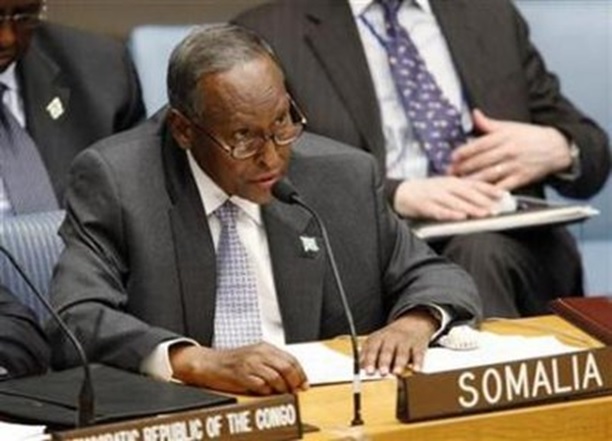By Liban Ahmad
The federal system of Somalia introduced in 2004 does not sound as a defensible proposition as it was ten years ago. What has changed in Somalia since 2010 to turn the federal system into a cumbersome, divisive and sovereignty-sapping foundation of governance?

President Abdullahi Y. Ahmed did not envision sovereignty-sapping federal system
The idea of a federal system for Somalia in post-1991 Somalia was first proposed by the former Somaliland President Abdirahman Ahmed Ali, but was successfully negotiated in 2004 by Puntland President Abdullahi Yusuf Ahmed. Before being elected a President in 2004, President Abdullahi had promoted federalism as the viable political system for a country that experienced state collapse in 1991.
Concentration of power and resources at the centre partly resulted in state collapse, went one argument. Displacement and dispossession were trends that strengthened the case for the federal system. It was not only the state failure that earned Somalia the appellation a failed state, but the desire of politicians to reintroduce the centralised political system in one form or another.
Puntland champions federalism in bid to avoid a return to centralisation. The federalism to which Punland is sentimentally attached differs from the federalism argument that President Abdullahi defended against its detractors.
The early strengths of the federal system have been undermined by the subsequent weaknesses. During the first four years, the federal system faced challenges. Warlords who participated in the Kenya-sponsored reconciliation conference, at which federalism was adopted, had opposed the federal government. They were keen to keep their fiefdoms in south Somalia. With the defeat of warlords at the hands of the Union of Islamic Courts in 2006, the Transitional Federal Government of Somalia had faced a more formidable challenge from a militant organisation that viewed the government as Ethiopian stooges.
UIC declared war on Ethiopia and the TFG. That unforeseen decision tipped Somalia into a two-year war between Ethiopian forces and UIC fighters known as Muqawima (resistance forces). When President Abdullahi Yusuf Ahmed opposed peace talks between resistance forces and TFG and unlawfully sacked his Prime Minister, Nur Hassan Hussein, the parliament reversed the decision. The federal institutions President Yusuf co-founded had intervened to prevent him from misusing his presidential powers. He had to resign in December 2008.
Abdullahi Yusuf subscribed to a view that the federal system and states do not have parallel powers, and that the central government should never exercise power unaccountably. He intervened in Puntland politics in 2007 to settle a dispute on the election held in January 2009.
Federalism after 2008
In January 2009 President Sharif Sheikh Ahmed was elected President of Somalia in Djibouti. The Parliament was expanded to include MPs appointed by the Alliance for the Reliberation of Somalia. The expanded parliament paved the way for the loss of the role of the legislature to check powers of the executive branch. From 2009 the new Transitional Federal Government under President Sharif Sheikh Ahmed secretly sought to retrieve Somalia’s frozen assets.
The Transitional Federal Government of Somalia formed in 2012 followed suit and kept the parliament in the dark about a plan that culminated in the indictment of a Maryland-based attorney whom the Somali Government had appointed to advise on the repatriation of Somali assets in foreign banks. Those two policies were harbingers of the transformation of the federal system into a tool to enrich unaccountable politicians and their hangers-on in the name of the Somali sovereignty.
The worst aspects of the federal system came to light through agreements Federal Member States have signed with foreign companies and countries, agreements involving national infrastructures. This is not the federal system Abdullahi Yusuf Ahmed had in mind; it is the federal system Puntland leaders defend to weaken sovereignty of Somalia.
In 2017 when former Puntland President Abdiweli Mohamed Ali, a former TFG Prime Minister, signed a deal with the DP World owned by the UAE government, the Puntland flag was on the table alongside the flag of UAE. Now that DP World has been delisted, Puntland has been reluctant to raise questions about the violation of the agreement concluded between a Somali Federal Member State and a listed company backed by a sovereign country.
In 2018 the former Somali Foreign Minister, Ahmed Isse Awad, urged UAE “reconsider its contract with the breakaway region of Somaliland and work with federal authorities so Somalia’s sovereignty is not violated”.
The federal system has had a modicum of stability in the sense that four presidents have occupied Villa Somalia since 2004. However, proponents of the federal system failed to address the plight of the marginalised Somali social groups who do not identify themselves with Federal Members. The 4.5 power-sharing system proved too difficult to be phased out or rectified.
Co-opting UIC leaders into the federal government was a timely idea that made the system more vulnerable to the whims of a few people who, to discredit federalism, espouse policies that diminish the sovereignty of Somalia and expose its infrastructure to abuse by unscrupulous politicians. The question all Somali presidential candidates must answer is: Should the Somali federal system be kept in its current state or will it have to be reformed to protect the national interest of Somalia?
Liban Ahmad
Email:libahm@gmail.com

Leave a Reply